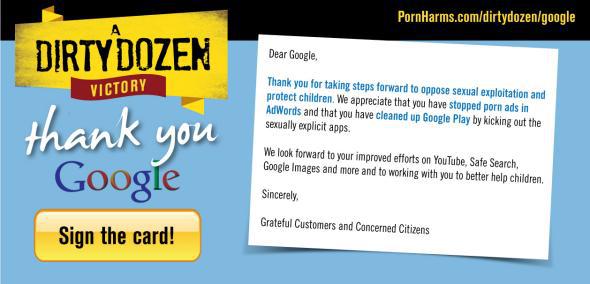Remember the long-running wars between conservative “family values” activists and the TV and movie industries? They’ve moved online.
The group Morality in Media is claiming victory after Google stopped running ads for pornographic websites. Google announced the changes in March and sent notices to advertisers in June, according to VentureBeat. An excerpt from the notice:
Beginning in the coming weeks, we’ll no longer accept ads that promote graphic depictions of sexual acts including, but not limited to, hardcore pornography; graphic sexual acts including sex acts such as masturbation; genital, anal, and oral sexual activity.
The move cracked the mainstream news this week when CNBC reported that the new policy took effect on Monday.
In a June press release, Morality in Media traced the policy change to “a productive meeting” it had with Google in May. In both 2013 and 2014, the activist group had named Google to its “Dirty Dozen List” of companies responsible for “the spread of pornography and exploitation,” and called on supporters to distribute flyers, sign petitions, and contact company executives to complain. Now it’s urging them to sign a thank-you card to Google. “We are grateful that they are realizing that their profits from porn are not worth the devastation to children and families,” the group said.
Presumably, Google just earned its way off of next year’s Dirty Dozen List.
The company is downplaying the changes, though. A spokesperson pointed out that Google has long placed restrictions on adult content in its AdWords service. The ban, from Google’s perspective, is just the logical next step.
Asked whether the push from conservative groups influenced its decision, Google had no comment.
Some porn advertisers told CNBC they felt betrayed by the company. “I was one of the very first advertisers for AdWords back in 2002,” the CEO of AVN Media said. “It’s something that’s been [untouched] for 12 years, so you don’t expect change is going to start happening.”
An industry attorney added: “This is another example of a mainstream company turning its back on the industry that has supported it. The question now becomes: Will they block adult content from their search results?”
It’s hard to feel too much sympathy for advertisers in an industry as sexist and exploitative as online pornography. But the search-results question is a provocative one. Google may no longer be taking money from porn purveyors through its AdWords program, but it’s still feeding them tons of traffic. How will Google respond if activist groups make that their next campaign?
Historically, Google has shied away from incorporating moral judgments into its search results. It was built as a tool to help people find what they’re looking for on the Web, whether or not others approve of their tastes. Over the years, though, Google has acknowledged that some types of sites, particularly those involving inherently illegal activity like child pornography, don’t deserve a place in its rankings. It is also now being compelled to censor certain pages and news stories about people claiming protection under the European Union’s new “right to be forgotten” law.
With great power comes great pressure from activist groups and governments. It’s another reminder that not being evil isn’t as simple as it sounds.
Previously in Slate:
